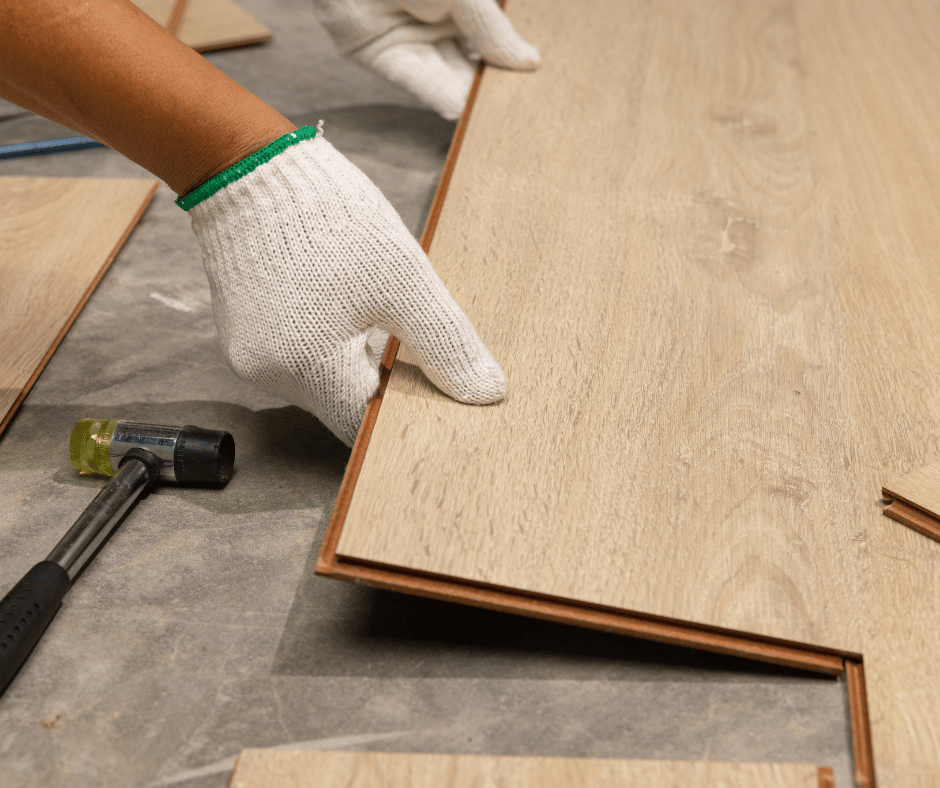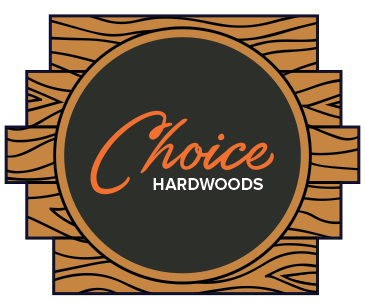LVP Vs. Engineered Hardwood Flooring
Choice Hardwoods Guide: LVP vs. Engineered Hardwood Floors
When choosing between LVP (Luxury Vinyl Plank) and engineered hardwood floors, it’s essential to understand their types, durability, water resistance, and the materials that may not be ideal for your needs. Let’s break it down:
1. Types of LVP (Luxury Vinyl Plank):
LVP comes in several varieties, with differences in quality, construction, and performance:
Standard LVP:
- Made of multiple layers: a backing layer, a core layer (typically made of vinyl), and a wear layer that gives durability.
- Offers a range of styles and colors that mimic hardwood, stone, and tile.
Rigid Core LVP (SPC or WPC):
- SPC (Stone Plastic Composite): The core is a mix of limestone and stabilizers, which makes it more rigid and durable. It’s great for high-traffic areas and can be waterproof.
- WPC (Wood Plastic Composite): Made from a mix of wood and plastic, offering a more comfortable feel underfoot, good for residential settings, and also waterproof.
Loose Lay LVP:
- Doesn’t require glue or nails to install; the planks stay in place due to their weight and friction. Easy to replace, and the water resistance varies depending on the brand.
Waterproof and Resilience of LVP:
- Waterproof: Most high-quality LVP, especially SPC and WPC types, are completely waterproof, making them suitable for bathrooms, kitchens, and basements.
- Durability: LVP is highly resilient and can withstand heavy foot traffic, scratches, and dents. The wear layer thickness often determines its durability.
2. Types of Engineered Hardwood Floors:
Engineered hardwood floors have a top veneer of real wood, but the core is typically made of multiple layers of plywood or high-density fiberboard (HDF).
Standard Engineered Hardwood:
- Made with a thin veneer layer of real hardwood on top of multiple layers of plywood or fiberboard. It provides a real wood look but is more stable than solid hardwood in fluctuating humidity levels.
7-Ply Engineered Hardwood:
- Features 7 layers of wood, offering enhanced stability and durability. Suitable for areas with moisture or temperature fluctuations.
Engineered Hardwood with a High-Quality Wear Layer:
- A thicker wear layer (around 4mm or more) will allow for better longevity and refinishing options.
Waterproof and Resilience of Engineered Hardwood:
- Water-Resistant: While engineered hardwood can tolerate moisture better than solid wood, it is not truly waterproof. Spills should be cleaned promptly, and it should be avoided in very wet areas like bathrooms.
- Resilience: Engineered hardwood is more stable than solid wood because the multi-layer core resists expansion and contraction due to moisture or temperature changes. However, it’s still more prone to water damage than LVP.
3. Materials to Stay Away From:
Low-Quality Engineered Hardwood:
- Avoid low-quality engineered hardwood with thin wear layers. It will wear out quickly and may be harder to refinish over time. Thin wear layers (less than 2mm) can compromise the longevity and refinishing ability of the floor.
Cheap LVP:
- Avoid extremely cheap LVP that uses a low-quality wear layer. It may scratch easily, fade faster, or be more prone to damage from spills or impact. Also, look for phthalate-free LVP to avoid harmful chemicals in lower-quality products.
Solid Hardwood in Moisture-Prone Areas:
- Avoid solid hardwood floors in bathrooms, basements, and kitchens. Hardwood absorbs moisture, which can cause it to warp or expand over time.
Final Recommendations:
- If waterproofing and resilience are your primary concerns, go for SPC or WPC LVP. These are waterproof and highly durable, ideal for high-moisture areas.
- Engineered hardwood is great for areas with moderate humidity and is a more eco-friendly option with a real wood appearance, but it’s not ideal for highly wet environments.
- Avoid cheap LVP and low-quality engineered hardwood, and keep solid hardwood out of high-moisture rooms.
Would you like recommendations on specific brands or need help with anything else regarding flooring?

Comparing Engineered Hardwood To LVP: What's Best For Your Home?
Let’s dive deeper into LVP flooring, its daily durability, cleaning practices, and compare it to engineered hardwood for general day-to-day use.
LVP Flooring: Daily Durability & Resistance
LVP (Luxury Vinyl Plank) is engineered to be highly durable, even in high-traffic areas, and holds up very well under various daily conditions. Here’s a breakdown of what LVP can handle:
-
Scratching & Dents:
- LVP is scratch-resistant, especially when it has a thicker wear layer (12 mil or above). It can handle pet claws, furniture dragging, and the general wear-and-tear from daily use.
- Dents: LVP is generally resistant to dents, but if heavy furniture is constantly moved without protection, you may see some minor impressions. However, SPC LVP (rigid core) has a tougher structure that is more resistant to dents than softer, thinner options.
-
- Waterproof: Most LVP, especially SPC and WPC, is completely waterproof. This makes it safe for kitchens, bathrooms, basements, and laundry rooms.
- Spills: Any liquid spills, like water, coffee, or food, can be wiped up easily without damaging the floor. However, it’s always best to clean up spills promptly to avoid water seeping into seams over time.
-
- UV Stability: High-quality LVP has UV protection to prevent fading, but prolonged exposure to direct sunlight can cause fading, especially in darker colors.
- Resistant to stains from common household items like oils, sauces, or cleaners (when used appropriately).
-
Heat & Moisture Resistance:
- LVP can handle fluctuating temperatures better than engineered hardwood. It won’t warp or expand/contract as solid wood does. That said, high heat (like in direct sunlight) can sometimes cause expansion in low-quality LVP.
- Moisture: It’s entirely resistant to moisture, so it won’t swell or buckle, unlike hardwood or laminate.
Cleaning & Maintenance of LVP
LVP floors are low-maintenance, but using the right cleaning products is key to preserving their appearance and longevity. Here’s how you can safely clean LVP:
-
Daily Cleaning:
- Use a soft broom, dust mop, or vacuum with a hard floor setting to remove dust and debris.
-
Wet Cleaning:
- Use a damp mop with a pH-neutral cleaner specifically designed for vinyl floors. Avoid using excessive water or harsh chemicals, as this can weaken the protective finish over time.
- Brands like Bona Hard-Surface Floor Cleaner and Rejuvenate Floor Cleaner are great choices.
-
Avoid:
- Harsh abrasives, ammonia-based cleaners, or wax-based products, as they can dull the finish or leave streaks.
- Steam mops should generally be avoided since the heat and moisture can potentially warp the seams over time.
-
Spot Cleaning:
- For stains, use a mild solution of dish soap and water or a floor cleaner recommended for vinyl. You can also use rubbing alcohol on tougher stains, but always spot test first to avoid damaging the finish.
-
Extra Care for High-Traffic Areas:
- Consider using area rugs or furniture pads under chairs and tables to avoid excessive wear.
LVP vs. Engineered Hardwood: Which is More Durable?
When comparing LVP and engineered hardwood for general day-to-day use in a home, here’s how they stack up:
-
Durability:
- LVP is generally more durable in the long term for high-traffic areas, pets, kids, and moisture-prone environments. It resists scratching, denting, fading, and water damage better than engineered hardwood. Plus, the rigid core options (like SPC and WPC) add another layer of protection against impact and heavy use.
- Engineered Hardwood is more prone to scratching, denting, and water damage. While it’s more resistant to moisture than solid hardwood, it still swells or warps if exposed to water over time, and it’s also more sensitive to extreme temperature changes.
-
- LVP wins here too, as it’s much easier to maintain and clean. Engineered hardwood requires more attention to moisture, and you have to be cautious about not over-wetting it when cleaning.
-
Comfort & Feel:
- Engineered Hardwood has a more natural, warmer feel underfoot, and many people prefer it for aesthetics in living spaces, as it provides the look of real wood.
- LVP can feel a bit colder and less natural, but newer high-quality LVP (especially with thicker layers) is more comfortable than older types.
-
Cost:
- LVP can be more affordable than engineered hardwood, and its price varies depending on the brand and quality. However, high-end LVP can sometimes match or exceed the cost of mid-tier engineered hardwood, especially with premium finishes.
-
Aesthetic:
- Engineered Hardwood provides the classic look and texture of real wood, making it the preferred choice for many homebuyers when it comes to aesthetics.
- LVP has come a long way and can mimic the appearance of wood or tile quite convincingly, but it’s still a synthetic option, so some people may not prefer the look over natural wood.
Which is More Durable for Day-to-Day Use?
- LVP tends to be more durable overall for day-to-day use due to its waterproof properties, resistance to scratches, dents, and easy maintenance.
- Engineered Hardwood is a better fit if you want the real wood look, and you are willing to maintain it more carefully, particularly around moisture and potential high-traffic areas.
Conclusion
- LVP is ideal for high-traffic areas, kitchens, bathrooms, and homes with pets or kids due to its resilience, water resistance, and easy upkeep.
- Engineered Hardwood is great for living rooms, bedrooms, and areas where aesthetics and natural wood appearance are a priority, but it requires more care in moisture management.
Would you like more information on specific brands for either LVP or engineered hardwood, or need help choosing between the two based on your home’s needs?

